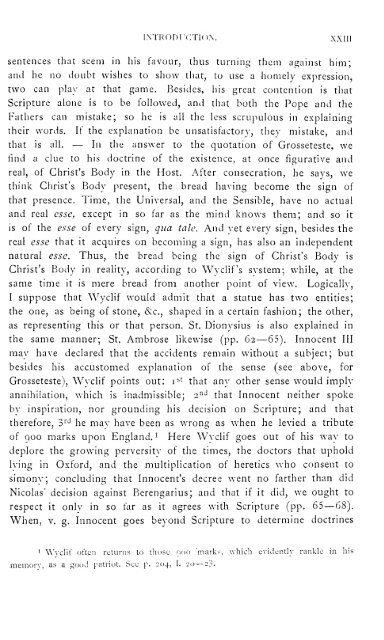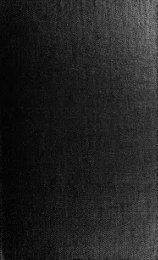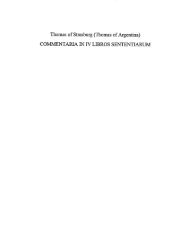Create successful ePaper yourself
Turn your PDF publications into a flip-book with our unique Google optimized e-Paper software.
INTRODUCTION. XXIII<br />
sentences that seem in his favour, thus turning them against him;<br />
and he no doubt wishes to show that, to use a homely expression,<br />
two can play at that game. Besi<strong>de</strong>s, his great contention is that<br />
Scripture alone is to be followed, and that both the Pope and the<br />
Fathers can mistake; so he is all the less scrupulous in explaining<br />
their<br />
that<br />
words.<br />
is all.<br />
If the<br />
— In<br />
explanation be unsatisfactory,<br />
the answer to the quotation<br />
they mistake, and<br />
of Grosseteste, we<br />
find a clue to his doctrine of the existence, at once figurative and<br />
real, of Christ's Body in the Host. After consecration, he says, we<br />
think Christ's Body present, the bread having become the sign of<br />
that presence. Time, the Universal, and the Sensible, have no actual<br />
and real esse, except in so far as the mind knows them;<br />
and so it<br />
is of the esse of every sign, qua tale. And yet every sign, besi<strong>de</strong>s the<br />
real esse that it acquires on becoming a sign, has also an in<strong>de</strong>pen<strong>de</strong>nt<br />
natural esse. Thus, the bread being the sign of Christ's Body is<br />
Christ's Body in reality, according to Wyclif 's system; while, at the<br />
same time it is mere bread from another point of view. Logicallv,<br />
I suppose that Wyclif would admit that a statue has two entities;<br />
the one, as being of stone, &c, shaped in a certain fashion; the other,<br />
as representing this or that person. St. Dionysius is also explained in<br />
the same manner; St. Ambrose likewise (pp. 62— 65). Innocent III<br />
may have <strong>de</strong>clared that the acci<strong>de</strong>nts remain without a subject; but<br />
besi<strong>de</strong>s his accustomed explanation of the sense (see above, for<br />
Grosseteste), Wyclif points<br />
out: i<br />
st that any other sense would imply<br />
annihilation, which is inadmissible;<br />
2 nd that Innocent neither spoke<br />
by inspiration, nor grounding his <strong>de</strong>cision on Scripture; and that<br />
therefore, 3 rd he may have been as wrong as when he levied a tribute<br />
of 900 marks upon England. 1 Here Wyclif goes out of his way to<br />
<strong>de</strong>plore the growing perversity of the times, the doctors that uphold<br />
lving in Oxford, and the multiplication of heretics who consent to<br />
simony; concluding that Innocent's <strong>de</strong>cree went no farther than did<br />
Nicolas' <strong>de</strong>cision against Berengarius; and that if it did, we ought to<br />
respect it only in so far as it agrees with Scripture (pp. 65— 68).<br />
When, v. g. Innocent goes beyond Scripture to <strong>de</strong>termine doctrines<br />
1<br />
Wyclif often returns to those 000 'marks, which evi<strong>de</strong>ntly rankle in his<br />
memory, as a good patriot. See p. 204, 1. 20— 2 3.

















